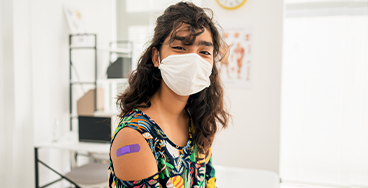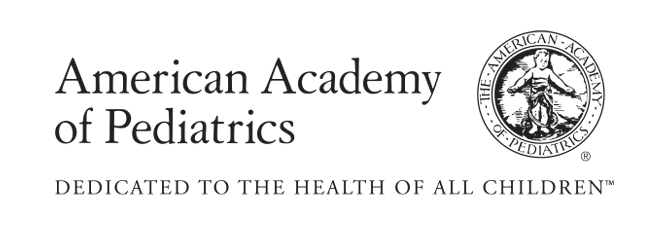Project Firstline Helps AAP Expand Infection Control Efforts to Improve Child and Adolescent Health Outcomes


The American Academy of Pediatrics is an organization committed to the optimal physical, mental and social well-being of all infants, children, and adolescents. AAP is one of many partner organizations working with the Centers for Disease Control and Prevention’s Project Firstline Collaborative. The project involves a group of healthcare and public health partners working to provide innovative and effective infection control practice (IPC) training for healthcare & public health workforces.
There are more than 67,000 pediatricians who are members of AAP across the United States and Canada; those members are part of the 59 chapters in the US and an additional 7 in Canada, allowing organizations to advocate for kids at the local level. Sean Diederich is the manager of the National Pediatric COVID-19 Training Center at the AAP. He said they became involved in infection prevention and control because it’s an essential part of pediatric practices in all settings. Diederich added that the pediatric population includes some unique challenges that must be considered when developing and releasing content.
“Project Firstline seemed like a really unique opportunity to address a lot of the goals we’re trying to achieve. Partnering with the CDC and other groups from across the initiative to ensure our audience gains critical IPC knowledge and confidence has been great.”
Diederich said one of the most beneficial parts of participating in the initiative has been the opportunity to build relationships and collaborate with partner organizations. These relationships have expanded outside of the project and he hopes they will last for years to come.
“As a partner, we’ve been able to raise pediatric health care provider awareness and provide infection prevention control guidance and recommendations. We’ve been able to release a lot of great resources that we likely wouldn’t have been able to release as quickly in the past.”
He said AAP has been evaluating their work over the last two years and it’s clear that their participation in the Project Firstline initiative has made a difference. It has allowed the organization to expand on current efforts such as ongoing infection and prevention and control education and stay up to date on the latest guidance and recommendations. Diederich said they’ve been able to make content more accessible in a lot more ways.
“Project Firstline has really allowed us to release content in a variety of ways. We’ve done podcast episodes, a video series, and hosted several Project ECHO series.”
Extension for Community Health Care Outcomes, or Project ECHO, is a telementoring program designed to create communities of learners by bringing together healthcare providers and experts in a variety of topic areas. It fosters an “all learn – all teach approach.” Diederich said Project Firstline has allowed AAP to expand its Project ECHO efforts and focus a lot of them on infection control. He said they’ve been able to train other Project Firstline partners so they can host Project ECHO series for their own audiences on infection control.
Project Firstline and ECHO have strengthened AAP’s relationships with their chapters.
“Chapters work at the state and local level. They’re able to really push out a lot of the Project Firstline messaging and education at the state level, which we can only do at a national level,” he said. “But I think it means a little bit more when it’s coming from somebody in your own state.”
AAP has always worked very collaboratively with the CDC but having staff dedicated at the CDC to work with AAP on this initiative has expanded what pediatricians can do. Diederich said it’s allowed them to obtain some of the technical IPC expertise to help members with questions they’re having around infection control, especially regarding the COVID-19 pandemic. Diederich said they’ve learned a lot of valuable lessons since AAP started working with Project Firstline.
Like many organizations, AAP had to adapt and curate their educational materials to both the different learning styles and constantly changing guidance throughout the pandemic. Diederich said it was important to figure out the best ways to inform updates to guidance and resources so members were kept up to date with the best infection control practices.
“I think one of the successful lessons learned is the opportunity to offer an open conversation and dialogue between practices and members,” he said. “That’s really where our Infection Control ECHO program came into play.”
AAP has hosted several ECHO programs that have looped in a variety of diverse work settings and practices from different regions. Diederich said many participants have talked about how helpful it is to hear from their peers and learn how they’re managing infection control during the pandemic. Offering the time and space for members to bounce ideas off each other and guidance from other experts has been helpful.
“I think it’s just a great way to keep pediatricians and probably all healthcare providers up to date on evolving practices and guidelines,” he said.
Diederich said Project Firstline has taught AAP the importance of building and maintaining cross-departmental collaborations and partnerships within their own organization. The group learned it was important to bring in as many perspectives as possible to make sure they were positively impacting processes and preparedness plans for future outbreaks. There have also been some unique challenges for pediatricians during the pandemic.
“I think one of the things we hear a lot of our members say is children are not little adults. It’s important that we do our best to advocate for them when content resources are being developed around infection control”, said Diederich.
The CDC has worked closely with all of its Project Firstline partners to improve IPC in every element of healthcare. Diederich says it’s been great to be able to work with them and develop a lot of resources that are more pediatric-specific. Another vital part of learning and creating tools or improving practices is noticing where there are gaps.
This project has done a great job of highlighting disparities and under-resourced audiences. That is why AAP is engaging more with its members and taking a critical look at their resources to be sure everyone is being served. AAP is holding focus groups on equity to make sure their resources are hitting the mark. Diederich said one of the things this process has reminded him of is the resiliency of the health care and public health workforce and their ability to care.
“Through all the hardships, our pediatric health care personnel continue to work every day to ensure the optimal physical, mental, and social health and wellbeing for all children and adolescents,” he said. “I think it’s pretty inspiring to hear stories from our members about what they’ve gone through and that it’s still important to them to learn and develop better IPC practices.”
AAP is one of many organizations that have partnered with Project Firstline. To see more of the work AAP has done with the project, visit their website. To learn more about the project, check out the CDC’s page, complete with tools and resources.